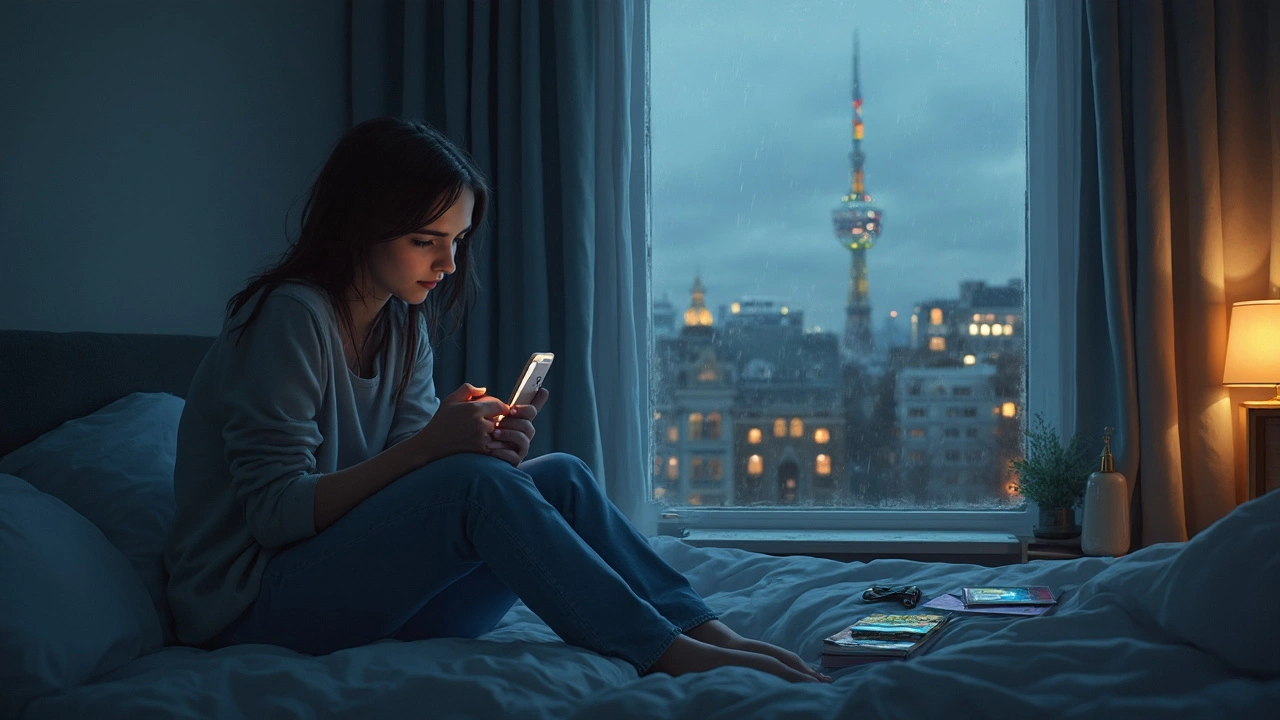People joke about being 'germaphobes' or claim they're just vigilant about their health, but health anxiety is a whole different beast. It's more than checking your temperature a few times, or double-taking at a weird bruise. Health anxiety makes you obsess over every ache, freckle, or twinge, convinced it’s a symptom of something serious—no matter how many times your doctor tells you you’re okay.
If you’ve lost hours Googling symptoms, or if one random headache sends your thoughts spiraling, you’re not alone. Surveys show health anxiety hits about 5% of people, and—get this—it’s just as common as OCD or panic disorder, but hardly anyone talks about it. That means a lot of folks go undiagnosed, quietly freaking out about diseases they probably don’t have.
So, why does health anxiety happen, and how can you spot it before it steamrolls daily life? Knowing what’s normal worry and what’s a red flag can actually save you stress—and maybe even money on unnecessary tests. Let’s break down what health anxiety looks like and what really helps.
- What Health Anxiety Really Means
- Why Health Anxiety Sneaks Up on People
- Signs You Might Miss
- When Google Makes It Worse
- Tips to Break the Worry Cycle
- Getting Real Help That Works
What Health Anxiety Really Means
Health anxiety isn’t just a quick worry that pops up and goes away after a checkup. It’s a pattern of thinking that gets stuck on repeat, making you convinced you have—or will get—a serious illness. Maybe you remember it being called hypochondria. The official medical term these days is ‘illness anxiety disorder,’ but the deal is pretty much the same. It’s not just in your head either—this can cause real physical stress, trouble sleeping, and make life tough.
With health anxiety, small things like a cough or a headache send your brain into overdrive. Even non-symptoms—like a normal heartbeat or muscle twitch—might start to feel like warning signs. You might ask for lots of checkups, tests, or blood work, but nothing seems to comfort you for long. Ironically, if someone tries to reassure you, it sometimes makes the worry worse.
| Fact | Details |
|---|---|
| Prevalence | Roughly 1 in 20 adults experiences health anxiety during their life. |
| Gender | Men and women get it at about the same rate. |
| Duration | Symptoms can last for years without treatment. |
What really sets health anxiety apart from regular worries? It's persistent, even when you get good news. It can make you avoid things you enjoy (like exercise or hanging out) for fear it’ll trigger symptoms—or, on the flip side, push you to do endless body checks or routines to "stay healthy." If you keep asking for reassurance, constantly research symptoms online, or spend too much time at the doctor’s office, you might be dealing with more than everyday stress.
So, health anxiety isn’t just "being a little worried"—it’s a full-time job for your mind, and it gets exhausting.
Why Health Anxiety Sneaks Up on People
Most of the time, health anxiety doesn't start out of nowhere. A lot of it comes from experiences or messages people get growing up—like having a parent who worried about every cough, or getting really sick as a kid. Sometimes, a real medical scare flips the switch. Once the worry kicks in, even normal stuff, like feeling tired or getting a headache, can send your brain into panic mode.
Social media and 24/7 health news don’t make it easier. Scary headlines or stories about rare illnesses catch attention. When people keep seeing or hearing about new diseases, it’s easy to start noticing every single weird feeling in your own body. Even TV shows and movies love to dramatize rare conditions; that sticks in your head more than you think.
Then there’s the rabbit hole of online searching. According to recent research from a U.S. health survey, over 70% of adults admit to searching online for health info, and about 25% later worry more about their health. So just looking up symptoms can raise anxiety—even if nothing’s really wrong.
| Trigger | How It Starts |
|---|---|
| Past illness or trauma | Your brain remembers feeling scared or hurt and kicks into overprotective mode |
| Family worries | Constant talk about health or seeing someone close always check for signs |
| Media scare stories | Nonstop news about health threats keeps you on edge |
| Online symptom checks | Websites show the worst-case scenario first |
Genetics can play a role too. Some folks are wired to be more anxious, which means worries about health can stick longer or hit harder. Major stress—like losing a job or going through a breakup—can also make health worries pop up. Your mind’s trying to control what it can, so it zeroes in on your body. Kind of like a smoke alarm that gets stuck on "high."
Recognizing how and why health anxiety sneaks in is a big step in fighting it. If you spot the patterns, you can start to break them before things spiral.
Signs You Might Miss
Health anxiety isn’t always obvious, even when it’s messing with your daily life. Plenty of folks don’t realize what’s going on, because the signs sneak up or show up in unexpected ways. You might think you’re just being careful, or that you’re a “worrier.” But when health anxiety takes charge, it’s a different story.
- Constant Self-Checking: Ever caught yourself poking at the same spot on your skin for days, or checking your pulse a dozen times before lunch? That’s not just being thorough—it’s a sign your mind’s stuck on overdrive.
- Asking for Reassurance: If you’re calling the doctor for every weird feeling, or bugging friends and family over every cough or twitch, you might be dealing with more than regular concern. People with health anxiety often need constant reassurance, but it never really helps for long.
- Believing the Worst: Sure, everyone worries sometimes, but with health anxiety, a random headache isn’t just a headache. It’s definitely something scary, like a tumor—at least in your mind. No matter what, you assume the worst-case scenario.
- Obsessive Googling: If searching symptoms online feels like a daily habit and it just leaves you more anxious, that’s another red flag. The internet can turn a harmless twinge into a medical drama in seconds.
Some people also start to avoid things that remind them of illness. Skipping social events, ignoring the news, or even steering clear of hospitals and TV shows about sickness. Sometimes it’s so subtle, you don’t notice it creeping up.
If you want to see just how disruptive health anxiety can get, check this out:
| Behavior | Percent Reporting (Adults with Health Anxiety) |
|---|---|
| Repeat doctor visits in 6 months | 64% |
| Checking body for symptoms daily | 58% |
| Googling symptoms weekly | 71% |
| Missing work or school due to worry | 39% |
Missed these signs? You’re not the only one. Recognizing them is the first step to getting back in the driver’s seat. The earlier you pick up on what’s happening, the quicker you can do something about it.

When Google Makes It Worse
If you’ve ever searched for symptoms online and ended up convinced you were dying, you know the rabbit hole: what started as a quick look turns into hours of reading about worst-case scenarios. This is textbook health anxiety—and Google makes it way easier to fall into that trap.
Here’s the thing: search engines are not doctors. But our brains treat internet results like gospel, especially when anxiety’s calling the shots. A 2023 study from King’s College London found that over 60% of people with health anxiety said their worries got way worse after looking up symptoms online. In fact, the phenomenon has a name now—“cyberchondria.”
It doesn’t help that if you type in “headache,” you’ll see brain tumors listed right next to dehydration and sinus problems. Algorithms push scary results higher up the page, because alarming headlines get more clicks. So, you end up spiraling from “mild cough” to “incurable illness” in a few minutes.
Spotting the signs that Google is making your anxiety worse can help:
- Checking multiple websites for reassurance, but feeling more nervous every time.
- Repeatedly searching for new symptoms, or rehashing the same old ones even after getting checked out.
- Comparing yourself to strangers on health forums and assuming you’ll have the same outcomes.
- Bouncing between different “possible diagnoses” and struggling to trust your doctor’s opinion.
If any of this sounds familiar, you’re definitely not alone. Take a look at this quick comparison of what happens before and after Googling symptoms for those prone to health anxiety:
| Before Googling | After Googling |
|---|---|
| Worried, but unsure about severity | Panicked and convinced of worst-case scenarios |
| Maybe thinking about seeing a doctor | Either too scared to seek real help or begging for tests you don’t need |
| Trying to distract yourself | Checking body constantly and feeling more symptoms |
So, what can actually help? If you catch yourself going down this path, try these quick changes:
- Set a time limit for Googling health stuff—use a timer and stick to it.
- Ask, “Will searching give me any new info I don’t already know from my doctor?”
- Stick to trusted websites like the CDC or your state’s health department, not discussion boards or random blogs.
- Make a deal with yourself to talk to a real doctor instead of searching online after a certain point.
Remember, your mind’s job is to keep you safe, but health anxiety can trick you with false alarms—and Google is its favorite fuel. Knowing this lets you take some control back, and that’s a game changer.
Tips to Break the Worry Cycle
Dealing with health anxiety isn't just about turning off your worries. The brain loves to latch onto 'what-if' health fears, but there are ways to snap out of the endless loop. Think of this section as your practical playbook. You don't need meditation experience or fancy journals—just a bit of effort and patience.
Start by noticing when you get stuck in a worry spiral. Most people with health anxiety check their bodies or symptoms constantly, or hop back on Google for the hundredth time. These moves offer quick relief at first, but actually keep the fear alive. Here’s what works better:
- Give the worry a name: When a scary thought pops up, say to yourself, “Oh, that’s my health anxiety talking, not fact.” Labeling it puts some space between you and your fears.
- Set a "worry time" window: Block out 10 minutes a day just for worrying. If a scary health thought shows up outside of that window, jot it down and tell yourself to save it for later. Most people find the urge passes once they’re not constantly feeding it.
- Cut down on checking and Googling: Studies show that symptom-searching online makes health anxiety worse. If your brain says "look it up," distract yourself with something else—walk, call a friend, or play a quick game.
- Use grounding tricks: When you feel panic creeping in, use the 5-4-3-2-1 trick: name five things you can see, four you can touch, three you can hear, two you can smell, and one you can taste. It keeps your mind in the present.
- Challenge scary thoughts: Ask yourself: “What’s the actual evidence for and against this idea?” Most terrifying health beliefs can’t stand up to a little detective work.
Check out this quick breakdown on what works and what usually backfires, straight from a recent NHS study:
| Helpful Tactic | Makes Anxiety Worse |
|---|---|
| Scheduled worry time | All-day symptom checking |
| Grounding exercises | Late-night Googling symptoms |
| Reality-checking thoughts | Repeatedly asking for reassurance |
Don’t expect miracles overnight. It’s all about tiny steps. People who stick with these methods often see their health worries shrink over weeks rather than days. If you ever feel too stuck to cope, reaching out for professional support can fill in the gaps not covered by self-help tricks.
Getting Real Help That Works
Dealing with health anxiety can feel impossible, but there’s a roadmap that actually works for a lot of people. No magic pills or overnight solutions, but real options that doctors use every day. The good news? You’re not stuck with this forever, and help doesn’t always mean medication.
The front line for treating health anxiety is Cognitive Behavioral Therapy (CBT). You sit down with a therapist who doesn’t just talk things over but teaches you specific ways to stop the worry cycle. There’s evidence—enough to make insurance companies pay for it—that CBT works better than just talking or venting. CBT can include:
- Learning to notice when you’re spiraling about symptoms
- Questioning scary thoughts with logic (sometimes by writing them down)
- Cutting back on checking your body or Googling symptoms
- Practicing new reactions when health worries hit
If the anxiety is severe, doctors sometimes add medication—usually SSRIs, the same stuff used for depression and other anxiety disorders. These don’t fix things overnight, but for persistent anxiety, they can take the edge off while you build new habits with CBT. Always talk with your doctor about side effects and what to expect.
People often ask if they should just avoid doctors and health info altogether. Not really. The trick is setting smart limits. Some experts suggest checking symptoms with a real doctor just once, not a dozen times, and then sticking to their advice for a set period (say, two weeks) unless something major changes.
Support groups—online or in-person—help too. Just hearing how others untangled the same fears gives relief. If you want proof, a UK study found people with severe health anxiety who got group therapy improved faster than those who went solo.
If you’re looking for fast action, here’s a solid starting plan:
- Schedule an honest checkup—one where you tell your doctor about your anxiety, not just the symptoms.
- Ask for a therapist referral (CBT specialists are the best bet).
- Commit to limiting online health searches (actually set a daily limit—use an app if needed).
- Track thoughts and worries in a notebook instead of your phone. Paper distance helps.
- Share what’s going on with someone you trust. Shame thrives in silence.
Stuck on waiting lists? There are digital CBT programs—like the UK’s NHS SilverCloud or U.S.-based MoodGYM—that people actually use to get started while waiting for a real therapist. Some of these are free or low-cost.
The real win with health anxiety is taking action, even if it’s messy. Obsessing and avoiding only dig you in deeper. Try a small step, track what changes, and don’t do it all alone. Chances are, there’s a way out that’s a lot closer than you think.





